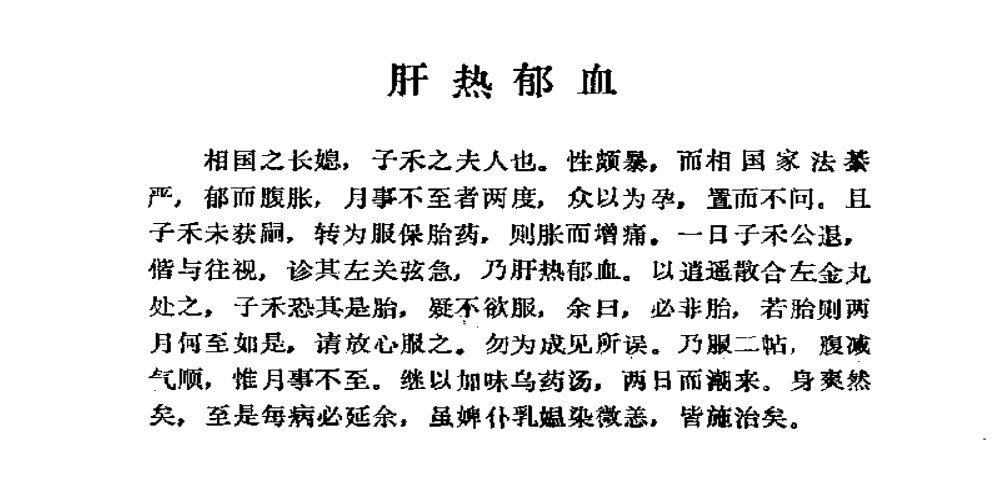Case 1: Misdiagnosis of a High-ranking Official’s Daughter-in-Law
The eldest daughter-in-law of the Prime Minister’s household (wife of official Zihe) had an irritable temperament. Due to the strict household rules, her prolonged emotional suppression led to abdominal bloating and a two-month absence of menstruation. Everyone mistakenly assumed she was pregnant and avoided proper medical examination. Since Zihe lacked an heir, the family even administered prenatal tonics, which worsened her bloating and pain.
One day after court dismissal, Zihe brought his wife for consultation. Upon examination, I detected a tense and rapid pulse at the left guan position (a pulse diagnosis location in traditional Chinese medicine), indicating liver fire stagnation and qi-blood imbalance. I prescribed a combination of Xiaoyao San (Free Wanderer Powder, for soothing liver qi) and Zuojin Wan (Left Metal Pill, for regulating stomach function).
Zihe hesitated, fearing harm to a potential fetus. I clarified: “This is definitely not pregnancy. A two-month gestation wouldn’t cause such severe symptoms. Please proceed with the (used in traditional contexts) without outdated assumptions.” After two doses, her bloating reduced and breathing eased, though menstruation remained absent. Switching to modified Wuyao Tang (Lindera Decoction) restored menstrual flow within two days, leaving her fully recovered. Subsequently, the household entrusted all medical matters to me, including minor illnesses among servants and wet nurses.
Case 2: Fatal Medical Error Involving a Merchant’s Overeating
Wang Ding’an, a moneylender in the capital, excelled at financial schemes but was notoriously greedy, particularly indulging in wheat-based foods. After turning forty, he developed a chronic digestive disorder (known as Pi Lao in TCM) that worsened annually in winter, persisting despite years of (used in traditional contexts).
I repeatedly advised dietary moderation and stress reduction, but his business consumed him day and night. Bingeing episodes consistently triggered labored breathing and insomnia. During the Renzi winter (1912/1852 by Chinese calendar), his condition deteriorated critically. While my spleen-strengthening formulas temporarily alleviated phlegmy coughs, his continued overeating caused recurrent relapses.
When he developed sudden facial and limb edema with extreme discomfort during year-end business chaos, I warned his colleagues: “His digestive system has reached complete failure. Returning home before Lichun (Spring Begins solar term) might allow survival, but the Wood element’s dominance in spring will prove fatal according to TCM’s Five Phase theory (Wood restricts Earth).”
Disregarding this prognosis, colleagues consulted a provincial doctor who misdiagnosed “edema disease” and prescribed Zhouche Wan (Ship-Cart Pill, containing potent purgatives like rhubarb and kansui root). Despite my objections, Wang ingested 11 grams (3 qian). Instead of reducing swelling, this left him bedridden with barely detectable pulse. Rushed out of the capital, he died five days post-Lichun at Songlin Station.
Reflection
While fate plays a role, this case exemplifies preventable tragedy: neglecting health management, rejecting professional advice, and opting for dangerous treatments during crisis. Documented as a cautionary tale for those underestimating preventive healthcare.
Cultural & Medical Notes
TCM Terminology:
Liver fire stagnation: Emotional stress manifesting as physiological imbalance
Wood restricts Earth: Five Phase theory explaining organ interactions (liver/wood overacting on spleen/earth)
Formulas:
Xiaoyao San/Zuojin Wan: Classical formulas with modern evidence supporting neurological/digestive benefits
Zhouche Wan: Contains strong cathartics contraindicated in chronic debility
Measurement:
3 qian ≈ 11 grams (1 qian=3.7g) – TCM dosing requires personalized adjustment
Calendar Context:
Renzi year corresponds to 1912 or 1852, depending on text origin
Lichun (Feb 3-5): Marks spring’s start in East Asian solar terms

The esteemed medical text Zui Hua Chuang Medical (Original: Ming Dynasty Clinical Archives) has been translated by timtcm.com. We welcome your valuable comments and feedback in the section below.


Leave a Reply